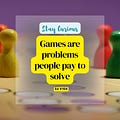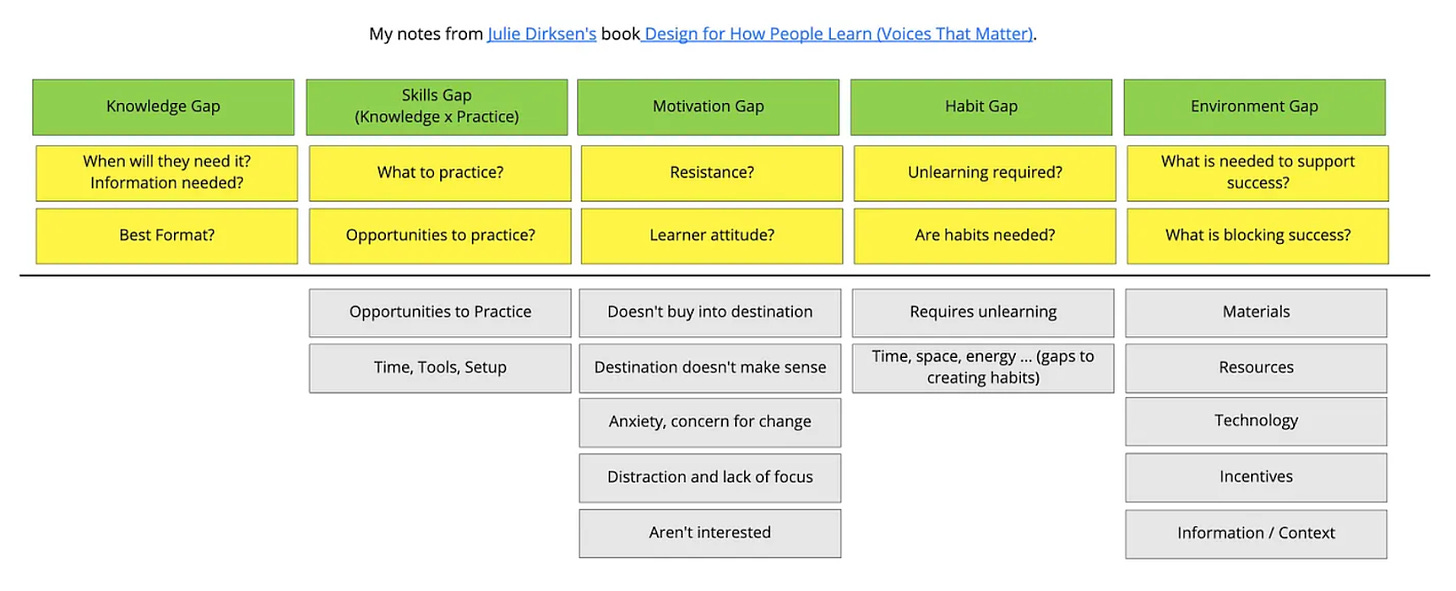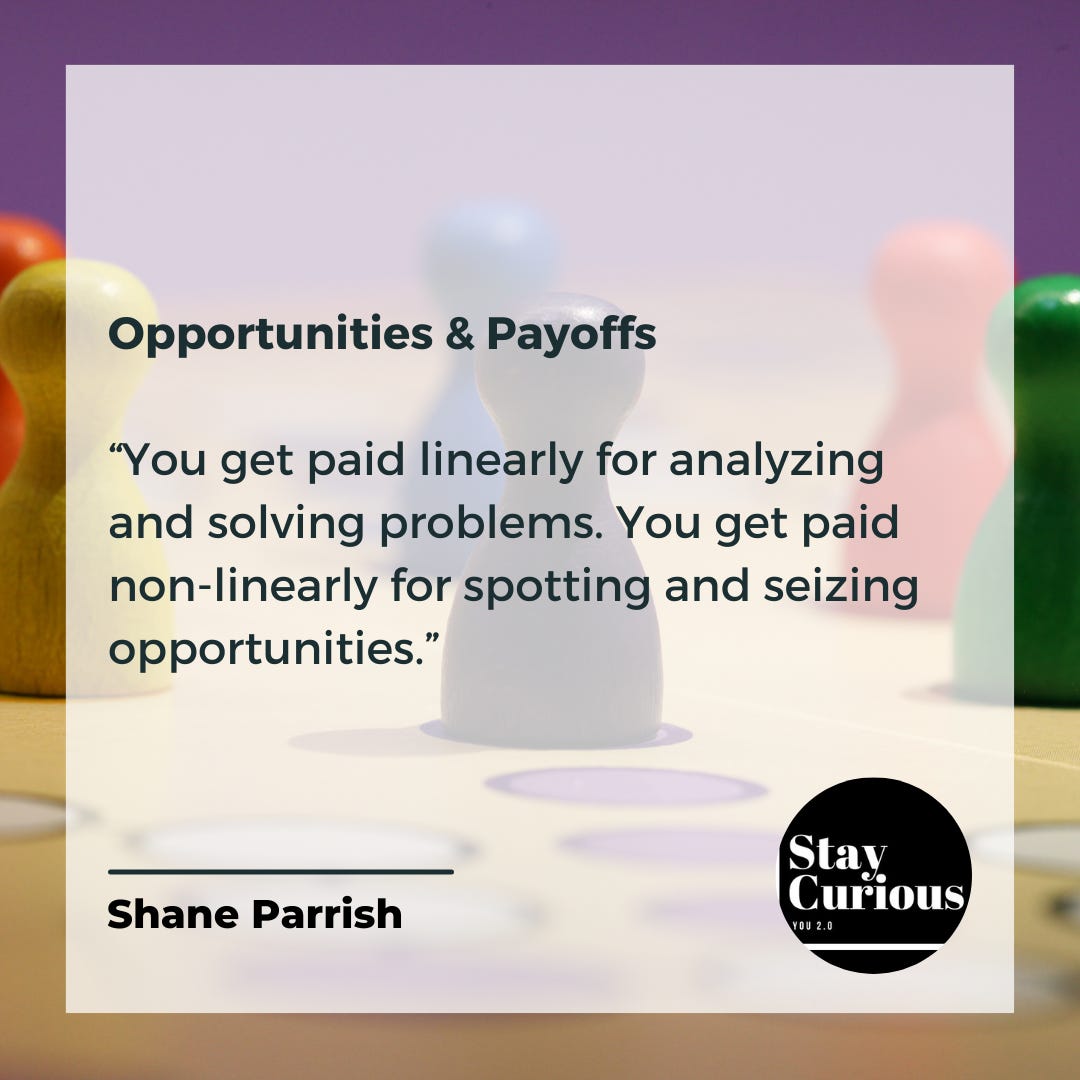Hey, Pritesh here.
We’ve reached post #104 in this journey of discovering new ideas & inspirations.
Here’s a quick glance of today’s post:
🔁 How to make optional practices a habit
🎲 Understanding games
💡 Learning from other’s learning
🐇🕳️ Treasure trove that is Boz’s blog
🇮🇳 Lessons in serving Bharat users.
And much more…
If you enjoy reading “Stay Curious”, show your love by ❤️’ing it or leaving a comment or sharing it with a couple of your friends. Any support is highly appreciated.
And with that, let’s dive in.
1. Optional product practices
I love
’s writing as he is spot on identifying & pin pointing the real issues. When he describes a challenge, I feel as if he is describing my situation.“Making optional product practices stick” is one of those posts!
If you take out the ‘product practices’ aspect, you will find that it’s talking about a very common situation. How to make good habits - especially if the benefits are seen only in the long term (which will be the case with most good habits).
He gives a framework for assessing the situation:
Source: John’s post
He has some tactical advice on how to address these challenges. I am taking them up in my approach. If you’ve found any solutions, do share your learnings.
2. Why we play games?
’s “Games are problems people pay to solve” shares some powerful ideas to think about games & why people play them. Sample this:
All good games end up feeling good because they help us master a skill that will provide us with survival or reproduction advantage.
Surprising feedback. It’s important that there be uncertainty in the player’s mind about her ability. There’s no value in putting in effort if the answer is already known.
Great games present just the right amount of ambiguity about our skill level, and hence we’re attracted to them like bees are attracted to flowers.
Even if you’re not into game design, check this one for some good lessons on understanding human motivations.
3. Rules & Razors
It’s fun (and sometimes useful) to read the rules, razors and rubrics that others have collected. Sometimes they are formed over years of toil & experience, on others it’s just sheer luck when you learn from others.
’s post “My favourite rules & razors” does the latter for us. It captures many good ones, and makes this post worth a quick read. Here’re my favorite ones:Taleb's Surgeon: If presented with two equal candidates for a role, pick the one with the least amount of charisma. The uncharismatic one has got there despite their lack of charisma. The charismatic one has got there with the aid of their charisma.
Narcism Razor: If worried about people's opinions, remember they are too busy worrying about other people's opinions of them. 99% of the time you're an extra in someone else's movie
Naval's Razor: If a task is worth less than your ambitious hourly rate - outsource, automate, or delete it.
4. Writings of Boz
I have found a new rabbit hole - Boz’s blog. Andrew Bosworth - or Boz as he is more popularly known as - is the current CTO of Meta. His long journey at Facebook has resulted in innumerable stories & lessons worth sharing. His writing is simple and precise.
I had covered one of his ideas “Being plainspoken” in post #36.
Being plainspoken is speaking the truth from a place of care and authenticity. It accounts for what is heard, not just what is said. It is about the listener, not the speaker.
I’m surprised, I did not check his work further. Today, I share a few more ideas that I bookmarked for my reference:
On focus: The best time to stop a distraction is before it starts. The second best time is now.
On leadership communication: This is why it’s so important as a leader not to just communicate your decisions, but to communicate the context around them. That helps people to progress with fewer cycles on the immediate issue and it will also compound over time as they learn the more general rules that govern your thinking.
On risks of overfitting: But more pernicious than overgeneralizing from a single data point is overgeneralizing from multiple data points, because it gives us much more confidence that our model is accurate even if it may not be.
5. Pratilipi’s Growth story
I have heard many people on the internet discussing that Bharat users don’t pay, and to be honest, they are not entirely wrong. It’s a fact that nobody wants to pay for something that doesn’t provide enough value.
When Sahradayi Modi tells this, she is telling us the bitter truth that most of us are unable to comprehend about the Bharat user. I am building my business for this user group, so I’m always looking for ideas and learning from those who have been there & done that. Or have burnt their hands and have a lot of learning to share.
Sahradayi’s post “The beauty of negative churn” is a great read for anyone who is interested in this junta. She gets into intricate details of their growth funnel to share insights & approaches that have helped them so far.
Even if you don’t cater to this junta, I find this post a good reference for how to objectively think of your growth funnel.
Pratilipi, Stage, KukuFM, Kutumb, Voice Club, Krafto, Astro Talk are some of the products that I am following and trying to learn from. If you know any others, or know someone in these places, do let me know. I would love to connect & learn more.
6. Light reads
Some interesting posts & essays that are well worth reading.
Battery Technology Changed the World…and Then It Stalled - By Anna-Sofia Lesiv. Good primer on the history & present of Battery technology.
Why are beds flat? By Rory Sutherland. “It seems to me that our narrative of progress is highly asymmetrical. We credit ourselves for areas in which progress is fast, all the time failing to see where it is woefully slow.”
7. Everything else
Some random goodness from the internet:
Fasano Quotes - Thanks to the diligent note-takers who make such beautiful memories possible!
Opinion - size - age - shape - color - origin - material - purpose - noun - the right order for adjectives. If you’re into using them too often, check out this thread for a lot more insights & a fun chatter by the folks at Merriam Webster.
For all the chocolate lovers out there, here’s a fun infinite chocolate bar trick.
https://tinywow.com/ offers dozens of online tools for quick tasks for content creation. I’ve tried a bunch of them and found the results fairly ok. Easy & no login required (there must be some other price we must be paying for this, I am sure)
The title of today’s post is from Paras Chopra’s post by the same title. Paras’s writing is inspiring and focused on actionable inputs.
Before we sign off, here’s a thought for you to ponder upon
That's all for this week, folks!
I hope I've earned the privilege of your time.
If you enjoyed this post, show your love by ❤️’ing it or leaving a comment or sharing it with a couple of your friends.





I see parallels between the gaps and general habit-building advice (make it easy, attractive, desirable, easy). Where the parallels break for me is in Habit Gap. Product teams are already something to keep stakeholders updated. Now they've the choice of doing something better. The choice is between good versus better. For weight loss, for example, you're eating junk. You've to stop that and start eating healthy. Bad versus good. So my hunch is that good to better is a harder leap than bad to good.